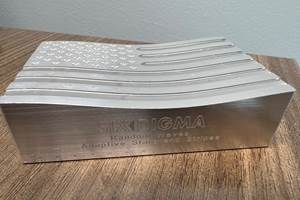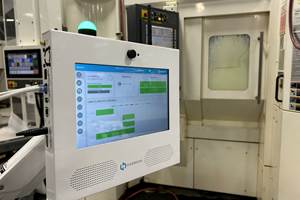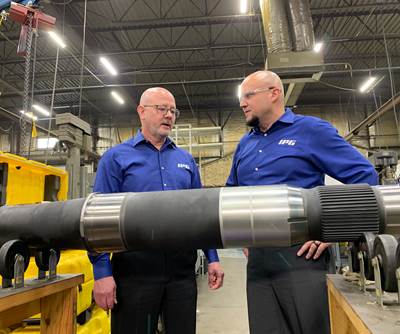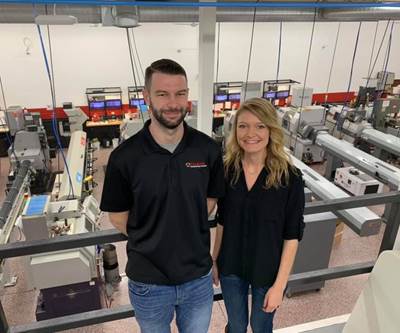Video: Succession Planning, Stewardship and Generation Change in Machine Shops
Leaders of Indiana Precision Grinding describe lessons learned related to succession planning and how the upcoming generation found its commitment to the business.
Share




On a visit to Indiana Precision Grinding in Indianapolis, Indiana, I spoke with company president Dave Cox and vice president Matt Cox. We recently covered this company’s transformation from job shop to aerospace specialist. But the company is preparing for even more fundamental change — the generational change that is part of the long-term success of many independent machining businesses. Dave Cox’s father founded the business, but made some succession-planning choices that made the way forward difficult for Dave when he took over. In this video, Dave describes the lessons he learned from this. Meanwhile, the third-generation leader, Dave’s nephew Matt Cox, talks about his experience with Modern Machine Shop’s Top Shops conference and how this experience opened his eyes to the possibilities of growing this established family shop.
Transcript
Peter Zelinski, Modern Machine Shop
I'm at Indiana Precision Grinding in Indianapolis and I'm here to talk about generations. Machining businesses are often family businesses and there are challenges in ensuring that the business survives and thrives from one generation to the next. Dave Cox is the president and the second generation owner of this business that does centerless grinding, OD, ID grinding, surface grinding, even double disc grinding and universal grinding. We're going to talk about a choice that your father made that was maybe an error, but first, your dad did a lot that was right. So introduce us to your father and talk about the business that he founded.
Dave Cox, Indiana Precision Grinding
My father, Bill Cox, founded this company initially as Centerless Grinding Company in 1975. My father was a journeyman tool and die maker who worked in multiple shops around Indianapolis. So it was in the management of these shops where he saw a niche for centerless grinding. So 1975 he bought a centerless grinder, a number two Cincinnati Milacron centerless grinder and put it in a 1200 square foot building. And that's where this company originally started from.
Peter Zelinski
He did something different. He found a niche, that niche has been successful for decades. So your dad, Bill Cox, when did he pass?
Dave Cox
He passed in 1999.
Peter Zelinski
What were you doing then? What was your role in the business?
Dave Cox
I was actually the plant manager at that time.
Peter Zelinski
And so what did you discover at that time about the way that your dad had structured the passage, the succession of the business?
Dave Cox
We had a buy-sell agreement in place. We had not revisited in several years. He became ill six months before he ultimately passed. The way that our buy-sell agreement was is that I would take over the management and the presidency of the company and begin to run it immediately. They made a decision for that to be delayed by two years. And I prepared myself by spending a lot of time with my customers, a lot of also family owned machine shops, understanding how they did their transitions, understanding how they planned, did business planning, how they involved other members of the family doing business planning. I had my stepmother here, she was actually encouraging me not to change anything whatsoever, or be able to invest, give people raises, do anything financially with the business whatsoever. A real difficult challenge was during those two years, a lot of cash capital that we have was stripped out of the business. So that gave me even less to work with once I did take over the company.
Peter Zelinski
So you were in the awkward position where you did not have ownership of the company, even though you were still the one who needed to lead and steward the company.
Dave Cox
That's correct.
Peter Zelinski
And it's also true that the financial structuring of the transition impeded you against investing. Is that true?
Dave Cox
That's absolutely true. The mechanism that we used was a treasury stock note. So as soon as we started with the treasury stock note on the company's balance sheet, and at the number that it was, it put us into negative equity, substantial negative equity immediately, which wouldn't allow me to get traditional bank financing. So that sole choice and that choice alone was a very, very difficult financial challenge to overcome. I was making $25,000 a month payments on a business that was making $200,000 in revenue a month. It became a huge challenge. So initially, I brought in an accountant from outside as our controller, she began to put projections together and sat me down and educated me about cash flow, and how this was going to look going forward. And she had minimal hope this company could survive with that financial structure.
Peter Zelinski
How did Indiana Precision Grinding come out of that?
Dave Cox
So, a couple steps that happened. While working with my controller, she brought me into a new group of attorneys. They encouraged me to put the company in bankruptcy, go through the process of beginning to put it in bankruptcy. I just couldn't do it. It was the business my father started. The only job I had had in my life at that point and it was not in my DNA. I just wouldn't accept it. So I went back to my stepmother. Put the picture out in front of her, explained the situation that we were having and she refused to negotiate. Because of this situation I had a great relationship with my stepmother prior that turned sour, and was really ruined by this. So it was a difficult relationship for me to navigate around. And that all changed one day, one September day in 2004, when Indianapolis received 12 inches of rain in less than 24 hours, and we ended up having a flood here in this building. I went back to her and to her advisors, and told them, "I'm ready to walk away from the business. You can have your business and you can have your building, I'm ready to move on." That's what it took for us to sit down and fairly renegotiate the treasury stock note to an amount that was really what the value of the business was. The things that I think were challenging more than anything else were the things that weren't talked about. We've never really sat down and I never spent time with him on that platform, on the ultimate leadership platform of running the business. I had never seen a financial statement in my life to that point. So the first thing that I've decided when I began to think about a transition plan was how would I communicate that with Matthew? Immediately be able to bring him in and let him start seeing the inner workings of the company, and let him be part of the decision making process.
Peter Zelinski
And the reason that those conversations are difficult, it's a lot of things, right? It's that you don't want to think about, yeah someday your work is going to end, someday your life is going to end. You don't want to think about that. And also, you're busy day to day with the business, you don't necessarily ever see a good time to just step back and unpack how the business is being run and how these decisions are being made. It's like there's never a good time to do that.
Dave Cox
Exactly. There's not. And I think that was how it was with my father. He started a business when he was 43. The first 10 years were a tremendous challenge to grow the business to a point where it could make a profit, where he could even contribute to the household. His success came late. His success came later in life when he really began to develop some profit and some personal wealth that came so late for him that he didn't want to give that up. He was in full business mode until the week that he passed. His parting words to me, from a business standpoint, he walked into my office the day before he went in for his surgery, shut the door and he looked at me and he said, "I don't ever want you to make this business like your hobby. It's not something you love like your family. This is a means, it's an avenue, for you to develop your income and wealth." That's exactly what he said to me and that stuck with me over the years. And I really had a challenge with that the first several years that I was running the business because I had that in my mind. What I had to shift was, from that mentality to "let me grow the business". I had to find my own way forward, I had to find my own vision. And that's one of the things that I tell people who are that next generation going into any business. You need to make sure that you have a vision. And that vision is your vision, because it's most likely going to be different than the founders.
Peter Zelinski
Matt Cox is vice president of Indiana Precision Grinding. We just met Dave. Matt is Dave's nephew. Matt, how old are you?
Matt Cox, Indiana Precision Grinding
I am 43 years old.
Peter Zelinski
How old were you when you started working here?
Matt Cox
So the very first time I started working here would have been spring of 2001. And I was 24 years old. Worked here for three years, did a career change, but I've been back here at IPG for just 10 years now, so that put me about 33, 34 years old.
Peter Zelinski
So 2019, pretty recently, Modern Machine Shop held our annual Top Shops Conference. You went to that conference, you experienced something there, it sort of changed some things. Maybe talk about that experience.
Matt Cox
Sure. So the first time I ever went to the Top Shops Conference, Dave actually encouraged me to go. We were supposed to go together, attend it together. Some situations happened out of our control. So I went there in Cincinnati, and I was just blown away, because I really didn't know what to expect. So the information, the presentations, all the way from keynote speakers to the individual workshops, really opened my eyes into the possibilities of what shops our size could be. So to take in the mindset that just because you're a small business doesn't mean you can't thrive, have clear objectives, goals, and want to operate more efficiently. So I came back with that information and probably drove Dave insane for the first few weeks because I was just wanting to talk about it. Let's have discussions. Let's look at some of these things we can apply here at IPG.
Peter Zelinski
What are some changes you can point to in this business that flowed out of that time?
Matt Cox
I heard a workshop about how to sell your quality management system. Something that you do every day, but you don't have to put together this magic formula and clichés and statistics. It's taking what you have and being the best you can at it. So it was encouraging our leadership team, let's take a step back for a moment and look at what we do, how long we've been in business, why our customers come to us. We have definitely looked at our estimating differently. You know, do we need to become more detailed in it? Or do we need to pull away from some of that detail? The customers just want price and delivery? Or do they really need the technical detail? How can we shift that to more engineering type conversations? So it gave us a perspective, it gave us to take a look at looking at our current ERP system, are we using it the way that we should? So it was kind of a revelation so to speak.
Peter Zelinski
Your family's business has always been about grinding. The way that the company's thinking about it now is changing. Talk about that a little bit. As a grinding service provider, how is your role changing and what do you see as the future of that role?
Matt Cox
What may have been just a "get it done" type mentality, we grind it and it goes with our customer, now it's what kind of support can we offer from quality, documentation, perfecting our grinding capabilities, our inspecting methods. We are growing more into a company, into a full blown service provider to strengthen our customer base to become that partner. Like we're your own private grinding house.
Peter Zelinski
So this business founded by your grandfather, it was led through some difficult times by your uncle. And now as you look around the company, and you see how it's continuing to develop today, what is distinctive about this business? What are you particularly proud of today?
Matt Cox
The experience we have here at IPG I feel is second to none. So it's building off of that. It's just not handing an order to one of our precision machinists to process but this is a precision machinist that has 20+ years of experience. He's very comfortable with his machine, he's very comfortable inspecting the part. It's taking that type of skill set that we have in our men, and allowing them to thrive. Also creating and implementing our values to who we are and not losing track of that, to make sure the atmosphere is always professional. That we are thriving in a teamwork type environment. Not being afraid to embrace things that we aren't doing now. I think one thing of working with Dave, he and I have always strived to look at that. Don't ever be quick to say no to an opportunity if we don't have what it takes to do it. Let's see what it may take for us to do it. So just because we're not doing it in 2020 doesn't mean that we may not be doing it in 2021.
Related Content
How to Pass the Job Interview as an Employer
Job interviews are a two-way street. Follow these tips to make a good impression on your potential future workforce.
Read MoreBuilding Machines and Apprenticeships In-House: 5-Axis Live
Universal machines were the main draw of Grob’s 5-Axis Live — though the company’s apprenticeship and support proved equally impressive.
Read MoreThe Power of Practical Demonstrations and Projects
Practical work has served Bridgerland Technical College both in preparing its current students for manufacturing jobs and in appealing to new generations of potential machinists.
Read MoreCan Connecting ERP to Machine Tool Monitoring Address the Workforce Challenge?
It can if RFID tags are added. Here is how this startup sees a local Internet of Things aiding CNC machine shops.
Read MoreRead Next
Deciding to Specialize as an Aerospace Supplier
Formerly a job shop serving a diverse local customer base, IPG responded to industry changes by transitioning into becoming an aerospace supplier. Here are the steps the shop is taking to make that change, including adding equipment and implementing plans for quality and marketing.
Read MoreSetting up Your Machine Shop for Succession Success
Here are ways the husband and wife owners of a machine shop in Fridley, Minnesota, are preparing for their son and daughter to take the reins.
Read MoreBuilding Out a Foundation for Student Machinists
Autodesk and Haas have teamed up to produce an introductory course for students that covers the basics of CAD, CAM and CNC while providing them with a portfolio part.
Read More




























